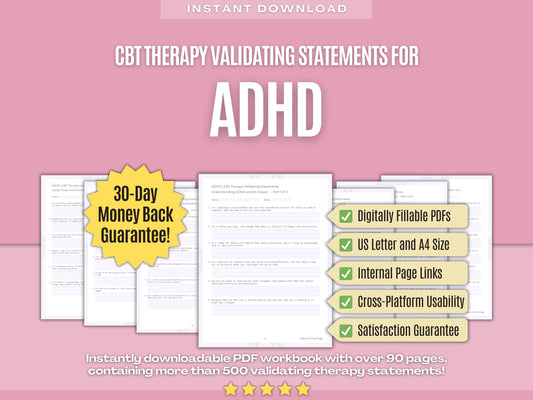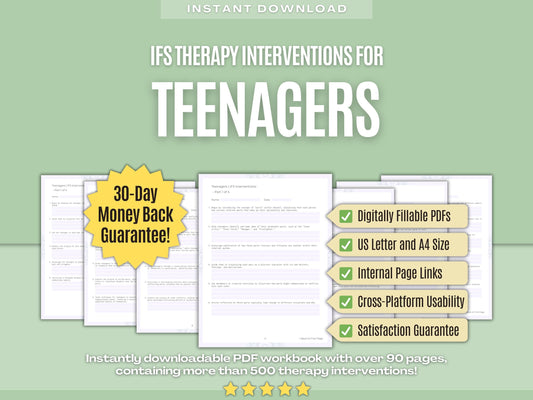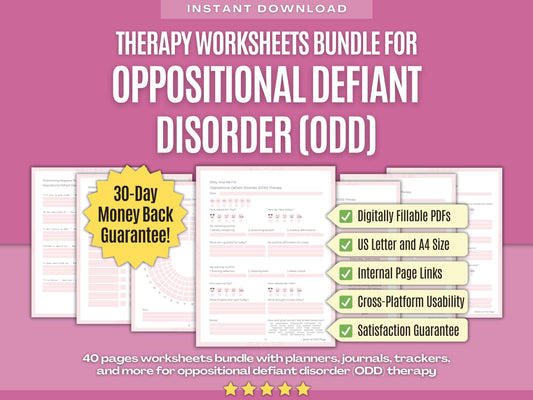Elevate Your Therapy and Guide Your Clients to Inner Healing with Our Dissociative Identity Disorder (DID) Coping Skills! ✨
1. Recognizing and Mapping Alters
- Practice mindfulness techniques to ground yourself in the present moment and connect with your internal experiences.
- Create a safe space in your mind where you can visualize a comforting environment to retreat to when feeling overwhelmed.
- Utilize relaxation techniques such as progressive muscle relaxation to release tension and promote a sense of calm.
- Explore creative outlets such as art, music, or writing as a means of self-expression and processing emotions.
- Use grounding exercises like the 5-4-3-2-1 technique to bring your focus back to the present moment and your immediate surroundings.
- Engage in physical activities like yoga or walking to help regulate your nervous system and improve overall well-being.
- Educate yourself about DID and the experiences of different alters to foster understanding and communication within your internal system.
- Use positive affirmations to challenge negative beliefs and reinforce a sense of self-worth and empowerment.
- Attend support groups for individuals with DID to connect with others who share similar experiences and learn coping strategies.
- Develop a routine or schedule to provide structure and stability in your daily life.
- Practice assertiveness skills to effectively communicate your needs and boundaries to others.
2. Communication Within the System
- Begin by establishing a safe and supportive environment within yourself, acknowledging the importance of open communication among alters.
- Foster a sense of trust and mutual respect among alters by validating each other's experiences and perspectives, even if they differ from your own.
- Develop a system of internal signals or cues to indicate when alters want to communicate or switch control, promoting cooperation and collaboration.
- Practice patience and compassion towards yourself and other alters, recognizing that effective communication within the system may take time and effort.
- Explore non-verbal forms of communication within the system, such as gestures, symbols, or artwork, to express emotions or convey messages.
- Develop a shared vocabulary or language that all alters can understand and use to communicate more effectively with each other.
- Practice assertiveness skills to advocate for your needs and preferences within the system, while also considering the needs and perspectives of other alters.
- Explore externalizing techniques, such as writing letters or creating separate personas, to facilitate communication between specific alters or parts of the system.
- Seek support from a therapist experienced in treating DID to facilitate communication within the system and address any conflicts or barriers to effective communication.
- Encourage alters to share memories, insights, and skills with each other to promote integration and cohesiveness within the system.
- Celebrate successes and milestones in communication within the system, recognizing the progress made towards fostering internal harmony and cooperation.
3. Establishing Internal Cooperation
- Start by acknowledging the importance of internal cooperation among alters for managing dissociative identity disorder (DID) effectively.
- Practice empathy towards other alters, striving to understand their perspectives, needs, and motivations.
- Develop a system of internal checks and balances to ensure that decisions and actions reflect the collective needs and values of the system.
- Establish a shared vision or set of goals for the internal system, providing direction and purpose for collective efforts.
- Practice active listening skills to validate the experiences and emotions of other alters, fostering a sense of validation and understanding.
- Develop a sense of collective identity within the internal system, acknowledging and embracing the diversity of experiences and perspectives among alters.
- Seek support from a therapist experienced in treating DID to facilitate internal cooperation and address any barriers or obstacles to collaboration.
- Use visualization exercises to imagine a harmonious and cohesive internal landscape where alters work together towards shared goals and objectives.
- Celebrate achievements and milestones in internal cooperation, recognizing the progress made towards fostering unity and collaboration.
- Use conflict resolution skills to address interpersonal issues or power struggles within the internal system in a constructive and compassionate manner.
- Create a safe space within the internal system where alters can express themselves freely and authentically, without fear of judgment or rejection.
4. Managing Triggers Effectively
- Begin by identifying your triggers, which are specific situations, people, places, or emotions that can lead to dissociative episodes or other symptoms of DID.
- Practice self-awareness techniques to recognize early warning signs of being triggered, such as changes in mood, body sensations, or thoughts.
- Utilize relaxation techniques such as deep breathing, progressive muscle relaxation, or guided imagery to calm your nervous system and reduce the impact of triggers.
- Establish a safety plan outlining steps to take when triggered, including contacting a trusted friend or therapist, seeking a safe space, or using crisis intervention techniques.
- Practice assertiveness skills to set boundaries and communicate your needs effectively in triggering situations, advocating for yourself and your well-being.
- Use visualization techniques to imagine a protective shield or barrier around yourself, deflecting triggering energies or emotions and maintaining a sense of safety.
- Develop a crisis plan outlining steps to take in severe triggering situations, including accessing emergency services or contacting a crisis hotline.
- Practice mindfulness techniques to cultivate present-moment awareness and non-judgmental acceptance of triggering thoughts and emotions, reducing their power over you.
- Seek professional help from a therapist experienced in treating DID and trauma to explore underlying triggers and develop personalized coping strategies.
- Practice self-compassion and kindness towards yourself when triggered, acknowledging that it's okay to feel overwhelmed and that you're doing the best you can.
- Establish healthy coping mechanisms such as exercise, healthy eating, adequate sleep, and relaxation techniques to strengthen your ability to manage triggers effectively.
5. Emotional Regulation Across the System
- Begin by acknowledging the complex emotional landscape that individuals with Dissociative Identity Disorder (DID) navigate, recognizing that each alter may experience and express emotions differently.
- Develop a shared vocabulary or language for emotions within the internal system, facilitating communication and understanding among alters.
- Practice mindfulness techniques to bring awareness to the present moment and regulate emotions across the internal system, reducing the risk of dissociation or emotional overwhelm.
- Use cognitive-behavioral techniques to challenge and reframe negative thought patterns or beliefs that contribute to emotional dysregulation within the internal system.
- Develop a toolbox of coping skills and strategies that can be used by alters to regulate emotions within the internal system, including relaxation techniques, distraction techniques, and self-soothing activities.
- Establish healthy boundaries within the internal system to protect against emotional overwhelm or dysregulation, respecting each alter's need for space and autonomy.
- Utilize external sources of support, such as therapy, support groups, or trusted individuals, to help regulate emotions within the internal system and provide validation and guidance.
- Practice emotional regulation skills as a collective effort within the internal system, recognizing that each alter plays a role in supporting and regulating the emotions of others.
- Engage in activities that promote emotional regulation and well-being across the internal system, such as exercise, nature walks, or spending time with loved ones.
- Practice patience and persistence in learning and implementing emotional regulation skills within the internal system, recognizing that progress may take time and effort.
- Develop a sense of self-awareness and insight into the triggers and underlying causes of emotional dysregulation within the internal system, allowing for targeted interventions and support.
6. Navigating Relationships with DID
- Begin by acknowledging the unique challenges and complexities of navigating relationships with Dissociative Identity Disorder (DID), both within the internal system and with external individuals.
- Communicate openly and honestly with trusted individuals about your experiences of DID, including the presence of alters, memory gaps, and other symptoms, to foster understanding and support.
- Practice active listening skills to genuinely hear and validate the perspectives, feelings, and experiences of others in your relationships, fostering empathy and connection.
- Develop a shared vocabulary or language for discussing DID within your relationships, allowing for open and respectful communication about the condition and its effects.
- Practice patience and understanding towards yourself and others in navigating relationships with DID, recognizing that it takes time and effort to build trust and mutual understanding.
- Use coping skills and strategies to manage triggers and stressors that may arise in relationships, such as relaxation techniques, mindfulness practices, and self-soothing activities.
- Practice self-compassion and acceptance towards yourself and others in relationships, acknowledging that everyone is doing the best they can with the resources and knowledge they have.
- Explore attachment-based interventions to address relational dynamics and promote healing and integration within relationships affected by DID.
- Utilize technology to facilitate communication and connection with others in your relationships, such as video calls, text messaging, or social media platforms.
- Develop a crisis management plan for addressing relationship challenges or crises, including strategies for de-escalating conflicts, accessing support, and maintaining safety.
- Use journaling as a tool for reflection and processing emotions related to relationships with DID, allowing yourself to express thoughts, feelings, and insights in a safe and supportive way.
7. Handling Flashbacks and Traumatic Memories
- Grounding techniques such as deep breathing exercises can help anchor you in the present moment when experiencing flashbacks or traumatic memories.
- Utilize the 5-4-3-2-1 method by naming five things you can see, four things you can touch, three things you can hear, two things you can smell, and one thing you can taste to reorient yourself during flashbacks.
- Create a safety plan outlining steps to take when experiencing flashbacks, including contacting a trusted friend or therapist.
- Use guided imagery to transport yourself to a peaceful or comforting place in your mind when faced with traumatic memories.
- Journaling about your experiences and emotions can provide a safe outlet for processing traumatic memories and gaining insight into triggers.
- Seek out sensory experiences that are soothing, such as taking a warm bath or sipping on a cup of herbal tea.
- Connect with your senses by focusing on the taste, texture, and temperature of food during mealtimes to ground yourself in the present moment.
- Engage in creative activities such as painting, drawing, or crafting to express emotions and distract yourself from distressing memories.
- Establish a routine that includes regular sleep, exercise, and nutritious meals to support overall well-being and resilience in coping with traumatic memories.
- Engage in relaxation techniques such as listening to calming music, practicing gentle yoga, or using aromatherapy to promote a sense of calm during flashbacks.
- Create a safety plan for your living space, including identifying safe rooms or areas where you can retreat during flashbacks.
8. Enhancing Social Skills for All Alters
- Practice active listening skills during conversations, ensuring each alter feels heard and understood.
- Role-play social interactions to build confidence and ease in social situations.
- Utilize grounding techniques, such as deep breathing or focusing on sensory experiences, to maintain presence during social interactions.
- Participate in collaborative activities, such as art therapy or team sports, to promote teamwork and camaraderie.
- Set realistic goals for social interaction, gradually increasing exposure to challenging situations over time.
- Explore hobbies or interests that facilitate social connection, such as joining a book club or volunteering in the community.
- Seek out supportive friendships or peer groups where alters feel accepted and valued.
- Create a safe word or signal that alters can use to indicate distress or the need for support during social interactions.
- Experiment with different social roles and personas, allowing alters to explore and express various aspects of their identity.
- Practice self-compassion and acceptance, acknowledging that social skills may vary among alters and progress takes time.
- Engage in exposure therapy techniques to gradually confront and overcome social fears or phobias.
9. Planning for the Future with DID
- Developing a comprehensive treatment plan in collaboration with a qualified therapist to address specific goals, challenges, and needs related to DID.
- Establishing realistic short-term and long-term goals that align with the values, aspirations, and capabilities of the system as a whole.
- Cultivating a sense of hope and optimism about the possibility of healing, growth, and integration through therapy and self-discovery.
- Seeking opportunities for skill-building and personal development through workshops, courses, or training programs that enhance self-awareness, communication, and coping abilities.
- Addressing practical considerations related to daily living, such as housing, finances, transportation, and healthcare, to ensure stability and security for the system.
- Cultivating healthy and fulfilling relationships based on mutual respect, trust, and communication, while setting boundaries to ensure safety and emotional well-being.
- Engaging in self-reflection and introspection to deepen understanding and acceptance of individual identities, fostering integration and harmony within the system.
- Practicing self-care rituals and routines to nurture physical, emotional, and spiritual well-being, prioritizing rest, relaxation, nutrition, and exercise.
- Seeking ongoing support and guidance from therapists, support groups, or online communities dedicated to DID to maintain motivation, accountability, and perspective.
- Exploring alternative healing modalities or complementary therapies, such as art therapy, somatic experiencing, or EMDR, to complement traditional psychotherapy approaches.
- Setting boundaries with oneself and others to prioritize self-care, personal growth, and emotional safety, recognizing the importance of honoring individual needs and limits.
10. Celebrating System Strengths and Achievements
- Reflecting on the unique strengths and abilities of each identity within the system, acknowledging their contributions, talents, and resilience in navigating life's challenges.
- Creating a safe and supportive environment within the system to openly acknowledge and celebrate achievements, milestones, and moments of growth, fostering a sense of unity and cohesion.
- Developing rituals or traditions within the system to mark and commemorate important events, accomplishments, or anniversaries, providing opportunities for reflection, connection, and celebration.
- Encouraging self-expression and validation among system members, offering praise, encouragement, and support for individual efforts and contributions towards shared goals and aspirations.
- Establishing a system-wide rewards system to incentivize and reinforce desired behaviors, accomplishments, and progress towards collective or individual goals, promoting motivation and self-esteem.
- Engaging in acts of self-care and self-compassion as a form of celebration, indulging in activities or experiences that bring joy, comfort, and fulfillment to system members.
- Reflecting on past challenges and obstacles that have been successfully overcome, acknowledging the progress and growth that has occurred since then, and celebrating the resilience and strength demonstrated throughout the journey.
- Incorporating humor and lightheartedness into the celebration process, finding joy and amusement in shared experiences, inside jokes, or playful interactions among system members.
- Documenting achievements, milestones, and moments of pride in a shared journal or scrapbook, creating a tangible record of progress and growth to look back on with pride and satisfaction.
- Participating in community events, workshops, or conferences related to DID awareness and advocacy, celebrating the strength and resilience of the broader DID community and contributing to positive social change.
- Hosting a system-wide gratitude circle or sharing session to express appreciation for the unique qualities, strengths, and contributions of each identity within the system, fostering a culture of mutual respect and appreciation.
We hope that our coping skills for Dissociative Identity Disorder (DID) therapy will help you to elevate your therapy practice and guide your clients to inner healing! Do you need more coping skills for Dissociative Identity Disorder (DID) therapy? Find them all in our Digital Workbook! Or do you have any questions or suggestions for us? Please feel free to contact us at any time!


















